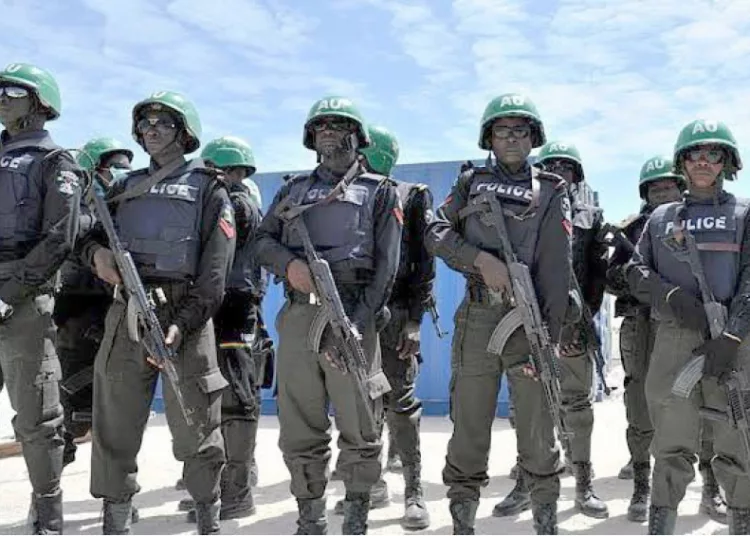Nigeria’s unique form of a federation maybe about to get more complicated with the passage of a bill in the House of Representatives for the creation of state police, which in theory, would constitutionally empower governors to be the chief security and law enforcement officers of their states.
By definition, the states should enjoy some level of constitutional independence from the central government in governance and internal affairs in a federation.
LEADERSHIP Sunday however discovered that not a single state in Nigeria has its own constitution, which would normally give a state the independence and a governor, the legal authority to be the chief law enforcement officer.
And should state police become a reality, criminal laws will become just as important as the political authority and the will to implement the laws by state governors. In many aspects, states are also still reliant on laws written in the colonial era.
Some lawyers who spoke with LEADERSHIP Sunday are of the view that this adoption of old laws underscores the fundamental principle of legal continuity and the enduring relevance of federal legislation in shaping the nation’s legal landscape, particularly in matters of criminal justice and public safety.
And as Nigeria continues to evolve in its hybrid form of government, they believe this presumption serves as a cornerstone for maintaining coherence and consistency within its legal system, just as the Administration of Criminal Justice Act (ACJA) has since modulated both the Criminal and Penal Codes.
At the state level however, LEADERSHIP Sunday discovered that some states rely on the same version of the criminal/penal code enacted in 1960s or earlier, while the houses of assembly have not passed any new laws since the 1999 constitution was introduced.
Our correspondents learnt that there are states that domesticated the Administration of Criminal Justice Act only as recently as 2022, like is the case in Delta and Bauchi or in 2023, which is the case with Borno.
In Kano, spokesperson of the Kano Judiciary, Baba Jibo Ibrahim, told LEADERSHIP Sunday that the sharia Penal Code provides punishment for both civil and criminal offences.
He said, “Sharia court laws in Kano are guided by administration of criminal justice law, 2019 of Kano state. The civil procedure is guided by sharia court civil procedure rule 2021“.
In Enugu, it wasn’t until 2017 that lawmakers passed the Administration of Criminal Justice law.
In Lagos, the Administration of Criminal Justice Law was first passed in 2007, amended in 2011 and was last amended in 2021. Generally, southwest states have been the most consistent in updating and amending their criminal laws thought Akwa Ibom first passed the law on criminal justice back in 2000.
In separate interviews with LEADERSHIP Sunday, Mike Ozekhome and Femi Falana, two Senior Advocates of Nigeria both agreed that the fact that states don’t have their own constitutions is more result of history, political expediency and the many years of military rule.
Falana admits that in the first republic, the various regions had their own constitutions, but by 1979, there was a general agreement to limit these powers given to state governors, who are the inheritors of the regional governments, because of some of the lessons learnt.
Quoting Justice Anthony Ogakwu, Ozekhome acknowledged the limitations of the present set up saying, “Federalism, as practised in Nigeria, has been argued to be an aberration as the concentration of power and resources at the centre is said to stifle the growth of the sub-units.”
According Ozekhome, states within a federal system may find themselves without their own Constitution for various reasons, including historical precedent, administrative expediency, or deliberate decisions made during the establishment of the Federal system.
The absence of State Constitutions in Nigerian states, he said, can be attributed to a combination of historical, political, and administrative factors.
He said, “Resource constraints, lack of political impetus, or a perception that the Federal Constitution adequately addresses state-level concerns may contribute to the decision not to draft separate state Constitutions.”
And should the creation of state police become a reality, observations by LEADERSHIP Sunday suggests some states could be handicapped by the criminal laws that should enable them to operate and a state constitution giving governors authority over them.
There are roughly a dozen countries operating a federal system of government. Countries like Germany and Canada have both federal and state-controlled police forces. In India and the United States however, it mostly a state affair. Nigeria though, is an exception.
Investigations by our correspondents show that at present, no chief executive in the states has clear cut authority over the investigation, prosecution and enforcement of laws in many criminal cases as governors share overlapping and sometimes conflicting powers with commissioners of police, the inspector general of police, and in effect; the president of the federal republic.
In some cases, the most an attorney general, who acts on behalf of a governor can do is give the police commissioner advice on prosecutions. The police however have enough leeway to follow or disregard the advice.
On this, Ozekhome said, “The Nigerian Constitution of 1999, while endowing governors with executive powers, imposes constraints to prevent encroachment on federal authority and assets. This dual source of authority mandates governors to navigate within the boundaries set forth by federal and state laws, statutes, and judicial interpretations.”
An example is in cases of armed robbery, kidnapping and murder, which federal law deliberately makes state crimes, but are usually investigated by the Nigeria Police Force, which is under the control of the president.
And according to Ozekhome, “This aptly highlights the centralization of power at the federal level under Nigeria’s federalism, posing challenges to sub-unit growth and responsiveness. The spate of security crises, such as the Chibok girls’ kidnapping and the Kaduna train abduction, underscore the imperative for governors to wield enforcement powers derived from the state.
“The clamour for restructuring Nigeria’s federal model reflects the urgency to decentralize power and empower governors to effectively safeguard their territories.”
LEADERSHIP Sunday investigation has shown that this constitutional entanglement has allowed state governors to avoid taking political responsibility for crimes like murder and kidnappings.
The commissioners on the other hand are not elected officials and usually pay no political or professional price for their failures.
But some law enforcement officers don’t think the present set up is particularly dysfunctional.
According to the Katsina State Police command, it has charged a total of 855 cases to competent court through the attorney general and state government.
Katsina is one of several states in the northwest that have plagued with banditry and kidnappings.
About 258 suspected armed robbers, 64 suspected kidnappers, 176 murder suspects, and 369 rapists/ soloists, the police command to LEADERSHIP Sunday, were arrested last year, 2023.
At the 17th Town Hall Meeting on security organized by the Lagos State Security Trust Fund (LSSTF) on December 12, 2023, the then Lagos State Acting Commissioner of Police, DCP Waheed Ayilara, disclosed that 189 robbery cases and 256 cases of gender-related violence were recorded in the state in 2023.
Most of these cases, including others like, stealing, traffic and environmental offences, assault and arson, ended up at the Magistrate’s Court, where the police are empowered by Section 23 of the Police Act, which provides that subject to Sections 174 and 211 of the 1999 Constitution (as amended), any Police Officer may conduct in person all prosecutions before any Court whether or not the information or complaint is laid in his name.
This provision has helped incredibly to enhance the administration of justice, especially in a state like Lagos, where the Ministry of Justice does not have enough lawyers to prosecute criminal matters in all the Magistrate’s Courts, unlike the high courts.
It is common practice to have a police prosecutor attached to each Magistrate’s Court to try these cases. Although most of them are not lawyers, they have undergone various training to equip them for the task.
However, the State Attorney General can take over any cases, transfer the cases to the high court, or discontinue the cases at any time before judgments are delivered by sections 174 and 211 of the 1999 Constitution.
Except for federal offences, which are filed at the Federal High Court, and labour matters, which are solely heard at the National Industrial Court, cases instituted at the Magistrate’s Courts and High Courts are brought under the state criminal law.
But in most criminal cases, LEADERSHIP Sunday learnt that there very little oversight from the attorneys general and governors leaving police prosecutors to do as they please.
The problem is just the fact that states are hiring enough prosecutors, according to Falana, it is politicians that are not committed to making the present structure work. He said, “The members of the Nigeria Police Council, just like we have security council, shall be constituted by the president, the 36 governors, the inspector general of police and the chairman of the Police Service Commission.
“You have a 39-member council. That council shall administer, supervise and organise the Nigeria Police Force. It is because that body is not functioning that people are talking of state police. The council is supposed to meet regularly to review the security situation in the country and take appropriate actions.
“But why did we abolish state police (regional) even when you had more mature politicians? In the North, the NEPU members were frequently arrested, jailed by the NPC government. That was why in 1979, it was generally agreed that we are not going to have state police. We won’t go back to that era.”
Falana asked, “Why was the regional police abolished? It was because politicians used them against their opponents. That is all. It was then resolved in 1979 that we were not going to have federal and state police.
“Could any have asked el-Rufai to have state police, demolishing the houses of his opponents? Or would you give state police to Wike? Or Bello of Kogi? That was why the country then agreed that we are going to have one police force, not federal government police.”
How NPF, Hisbah co-exist on streets of Kano
In a model of what state police working side by side with the Nigeria Police Force, the government in Kano back in 2003 passed a law creating the Hisbah Board, to enforce the penal code, though the actual powers of the board are limited.
Last week, a Sharia court judge order a TikTok social influencer, Murja Kunya, to undergo mental evaluation after she charge to court by the Hisbah Board for public disturbance.
Hisbah is an Arabic word that means accountability, and is an Islamic concept that calls for enjoining good and forbidding evil.
The Hisbah Board is made up of government officials, regular police officers, religious leaders and it is highly decentralized with local units supervised by committees composed of officials and citizens in communities where they operate.
The Hisbah Board was established by laws based on the constitutional provision that empowers the State House of Assembly to make such laws as contained in Section 4(6) of the Constitution.
The Kano State Hisbah Board Law, 2003 came into force precisely on the 7th day of November, 2003.
Section 7(1) of the Law empowers the Board to establish for the State “Hisbah Corps” who, according to the Section, may be eligible for appointment as Justices of Peace.
According to Section 11(1) of the Law, the Board shall have a Secretary who shall be appointed by the State Governor. The Secretary to be appointed shall be a legal practitioner of not less than 6 years post call experience. That Secretary shall be both the legal adviser and the head of the legal department of the Board.
According to an official, the role of the Hisbah is more of advisory, support, enlightenment and guidance as provided by the Sharia.
The Hisbah seems not to have any “actual power” to execute anything. The law seems to only empower the Corps to “advice”, “encourage” and “assist”, nothing concrete and definite! The Hisbah Corps clearly has no power to arrest, detain, waylay or force anybody to do anything against his or her will.





